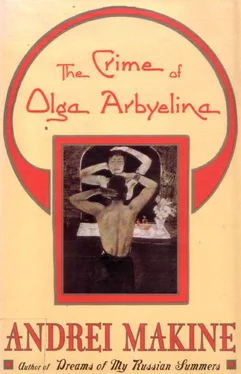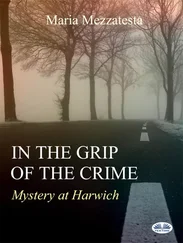Then there was the night of all-enveloping fog, smelling of the sea… With closed eyes she gave herself, happy, unthinking, liberated even by her blindness, by the uselessness of words, by the abandon she no longer had to feign… It was this forgetfulness that must have given her away She sighed, or rather took a breath like a child about to cry. He detached himself from her body and fled. She went through a long moment of nonlife before understanding the real reason for his flight.
It was a continuous sound, growing louder, more fluid. It was gradually permeating the muffled heaviness of the fog… At the first light of dawn, when she opened the window, she saw the meadow flooded, the willows standing in the middle of a lake, the water rippling gently a few yards away from the front steps…
By evening the entire Caravanserai had become an island and their house a little promontory above the calm, misty expanse of the waters.
It was the "doctor-just-between-ourselves," wearing long rubber boots, who brought them bread on the second day of the flood. Then the water rose several inches more and even this equipment became inadequate. People forgot them as they waited for the sun to return and the waters to fall.
The days were misty and mild, seeming not so much to exist now as to be a return to a far distant past when even pain was obliterated. At night all one could hear was the soothing lapping of the water on the front steps. And that night, when he came into her room, the cries of a flock of birds-no doubt migrants exhausted by their flight that had found no place to land and were alighting on the roof of the Caravanserai… It was beneath the rising tide of these innumerable cries that she surrendered her body to him again, her body which imperceptibly, from one night to the next, had won a secret freedom, inaccessible in aroused love. Her body that, in a death that was profoundly alive, responded to caresses and fashioned desire. A sleeping lover's body. Born in the depths of a dream that the boy could relive indefinitely.
When she opened the door in the morning she alarmed a dozen birds that had settled on the roof. They emitted indignant cries and began to circle over the dull mirror of the waters. Over the inverted sky that began at the top of the front steps, in which their silent, white wings could be seen slipping along…
Several days and nights were swamped in this misty calm, the drowsy idleness of the waters. Finally, one evening when it was still light, she noticed that the reflections of the clouds on the flooded meadow had moved farther from the house. A strip of bruised land emerged, bristling with stalks and clumps of grass, like the dorsal fin of an immense fish. This terra firma saturated with moisture surrounded the house and ran along the wall of the Caravanserai… Through the window she saw her son, a shopping bag on his shoulder, walking away slowly, sounding out with his feet the uncertain dotted line of this first footpath. An hour later he returned, laden. His shape was reflected in the waters now ablaze with the sunset. She hesitated, then went to greet him on the steps. They stayed there for a time, both of them, without looking at each other, motionless before the now tranquil expanse.
That evening, or perhaps it was the next, a thought struck her with the painfulness and beauty of its truth. If what they were living through could be called love, then it was an absolute love, for it was fashioned from a prohibition inviolable yet violated, a love visible only in the sight of God, because monstrously inconceivable to mankind, a love experienced as the everlasting first moment of another life…
For months her thoughts had spilled into the unthinkable and had become meaningless. Their return now disturbed her. She would have liked to go on living in the transparent and silent simplicity of the senses. Yes, to go back to the scent of the fire, to the powdery hoarfrost tumbling through the air from a snowy branch… But already a new link of chain was latching on to her mind: "For the boy this may be his first and last love. And for me? It is also my first and last love; for no one has ever loved me like this, with such a passionate fear of causing me harm. No one will ever love me like this again…" The truth of these words was born of lightness but, once uttered, became disturbing.
That night anxiety returned in the guise of a strange noise: it was as if someone were walking along in the water beside the house with careful steps, attempting, through the somnambulistic slowness of their pace, to minimize the little telltale splashes.
Next morning a bleak wind was blowing with inhuman, menacing power. It tore at a number of long, dry strands of hops on the walls of the Caravanserai, brandishing them in its rainy squalls like a monstrous topknot of snakes. As she went into the building through the porch, she heard the sound of an unusual tumult, the slamming of shutters in one of the empty apartments, but, in particular, a slow, distant, metallic creaking, like the noise of rusty hinges. Along the corridor that led to the main library hall this creaking increased in volume, becoming a ponderous, rhythmical crashing. The sounds of voices, on the other hand, became fainter and fainter, then faded away; and it was amid a crowd of dumbfounded spectators that this scene met her eyes.
High up near the ceiling the huge gearwheel for the pulley, mounted on girders fixed into the wall, was revolving with a mesmerizing slowness. Had the wind dislodged some locking wedge in the machinery, stopped for long decades? Or had the electrician who came to repair a breakdown in the current the previous day made a mistake over the cable? A cleaner had noticed the wheel moving that morning and alerted the others… Now the gearwheel was continuing to rotate steadily and inexorably in its blind power. The chain that ran around it could be seen traveling down, inch by inch, through a hole in the floor that had been hidden by a square of plywood. And, having disappeared, it rose again from the depths of the cellar… Suddenly, with a brief grinding, the plywood gave way, and there, welded to the chain, a bucket covered in rust and slime could be seen surging up, slowly bringing to the surface what must once have been water from a deep well that supplied the brewery… A bitter, earthy smell, an odor, it seemed, of flesh and death, invaded the room. Another bucket appeared, then another and yet another. The first one was already at the top of the chain and tipped, spilling out its viscous liquid where once, no doubt, there was a large vessel. The odor became more pungent, with its sweetish base of grain rotting in the bowels of the earth, with its disturbing, wild savor of fermentation. The subterranean mud from a fresh bucket was already decanting itself over its tilting rim… As if suddenly roused from sleep, a man rushed into the corridor to switch off the current.
There was an abundance of light, almost too much for eyes accustomed to the fog; an abundance of sparkling sky; an abundance of damp, glistening watercolor tones. The meadow that the river had gradually uncovered as it receded looked like a broad russet-and-yellow pelt, all ruffled, drying in the sun.
She perceived this surge of light with the sensibility of an invalid. Each ray of sun, each new color was simultaneously a joy and a torture. One day she told herself she must dig the ground in the narrow bed beneath the windows and plant the first flowers. Her heart stood still: she had a vision of herself the previous autumn on a fine September evening, pulling up the dead stalks at that same spot… On another occasion, returning late from the Caravanserai, she went down as far as the little expanse of water at the bottom of the meadow. The moon was shining on it and in the distance the tiny pond looked as if it were frozen. She went up to it and touched the surface with the sole of her shoe. Lazy rings rippled across the moon's liquid gold. As on that unimaginable Christmas night when they had broken the ice and rescued the fish…
Читать дальше












